AICOSERV final conference “AI for Public Sector Co-Creation: Values, Challenges and Competences”, 19 January 2026
On 19 January 2026, the Faculty of Management and Economics at Gdańsk University of Technology hosted the final conference of the AICOSERV project, entitled “AI for Public Sector Co-Creation: Values, Challenges and Competences.” The event marked the formal conclusion of a collaborative international project co-funded under the Erasmus+ Programme, implemented by a consortium of partners from Poland, Austria, Portugal, Germany, Sweden, and Ukraine.

The final conference served as a platform to reflect on the project’s outcomes and to advance discussions on how Artificial Intelligence can support co-creation, public value creation, and democratic governance. It brought together a diverse group of participants, including academics, public administration representatives, policymakers, practitioners, and technology experts, creating a rich interdisciplinary and practice-oriented dialogue.
The conference opened with welcoming remarks by Prof. Ewa Lechman, Prof. Michał Tomczak, and Prof. Tomasz Janowski, who highlighted the strategic importance of international cooperation, interdisciplinary research, and capacity building in addressing the governance challenges associated with AI adoption in the public sector. They emphasised the role of projects such as AICOSERV in bridging research, education, and public-sector practice.

The opening session was followed by two inspiring keynote presentations. Professor Adegboyega Ojo (Carleton University, Canada) shared insights into the use and governance of AI in the Canadian public sector, drawing on concrete institutional experiences and policy developments. Professor Virginia Dignum (Umeå University, Sweden) then addressed the foundations and practical challenges of responsible AI, focusing on ethical principles, accountability, and human-centric approaches in public-sector contexts.



Throughout the day, speakers from academia, public administration, and industry presented experiences, case studies, and applied research related to AI-enabled co-creation. Contributions from Dr Jan Cudzik (Gdańsk University of Technology / OutlineAI), Michał Kuszewski (City Hall of Warsaw), and Dr Nina Rizun (Gdańsk University of Technology) illustrated how participatory approaches, ethical frameworks, and technological innovation can jointly support public value creation and more inclusive governance processes. The discussions highlighted the importance of aligning technological solutions with institutional capacities, legal frameworks, and societal expectations.


The final part of the conference focused on building interdisciplinary competencies for the public sector and presented the concept of a new Erasmus Mundus Joint Master Programme, building directly on the results of the AICOSERV project. Contributions by Prof. João Álvaro Carvalho, Dr Nina Rizun, Dr Magdalena Ciesielska, Prof. Vera G. Meister, Prof. Luís Soares Barbosa, Prof. Tomasz Janowski, Prof. Marta Kuc-Czarnecka, and Dr Yuliia Bartashevska outlined the academic vision, governance mechanisms, and practical arrangements of the proposed programme. This session emphasised the need for future public-sector professionals who combine skills in AI, governance, ethics, co-creation, and evidence-based policymaking.


The conference concluded with reflections on the project’s overall impact and future directions. The organisers expressed their gratitude to all speakers, participants, and consortium partners - Noella Edelmann, Dr Aleksandra Revina, Nina Khairova, Naci Karkin, and Demetrios Sarantis - for their engagement, expertise, and contributions to the success of the AICOSERV project.
The AICOSERV final conference marked an important milestone in advancing AI-enabled co-creation in the public sector and laid a strong foundation for future educational and research initiatives in this field
AICOSERV Validation Seminar at UNU-EGOV: Joint mechanisms design for the Master’s Programme “AI for Public Sector Co-Creation”, November 19, 2025
On 19 November 2025, the AICOSERV team held a Validation Seminar on Joint Mechanisms Design, hosted by UNU-EGOV in Guimarães, Portugal.

The seminar brought together consortium partners from universities and research institutions to collaboratively refine the academic and operational foundations of the upcoming Erasmus Mundus Joint Master’s Programme AI for Public Sector Co-Creation.
The session gathered participants in a hybrid format and fostered a constructive working atmosphere focused on building a high-quality interdisciplinary programme for future public-sector innovators.
The validation seminar aimed to transform the conceptual framework developed within AICOSERV into a fully operational master’s programme. More specifically, participants were invited to:
- refine the structure and content of the interdisciplinary curriculum;
- validate the joint mechanisms required to deliver a multiple-degree programme;
- review student admission requirements and mobility rules;
- identify the academic, administrative, ethical, and inclusion-related standards needed for programme implementation;
- discuss joint services supporting students’ integration (visa support, language courses, inclusion services);
- agree on key elements of the partnership and student agreements.
The event opened with introductory remarks of the Director of UNU-EGOV, Prof. Delfina Soares, and a presentation of the AICOSERV objectives by Dr Nina Rizun, who highlighted the rationale behind developing a joint master’s programme at the intersection of co-creation, public governance, and AI.

Picture 1: Opening session

Picture 2: Dr Nina Rizun presenting the interdisciplinary curriculum of the Master’s Program “AI for Public Sector Co-Creation”
This was followed by a core presentation by Dr. Magdalena Ciesielska, who outlined the structure of the Joint operational mechanisms. Her session focused on procedures for admissions, evaluation, quality assurance, mobility, and degree awarding.

Picture 3: Dr Magdalena Ciesielska presenting the Joint Operational Mechanisms of the Master’s Program “AI for Public Sector Co-Creation”
We were grateful for the participation and insightful feedback from colleagues Yuliia Bartashevska, Demetrios Sarantis and Aleksandra Revina, who contributed to refining both curricula and governance procedures.
We extend a special thank you to our hosts at UNU-EGOV: Prof. Delfina Soares, Prof. Luís Soares Barbosa, Prof. Naci Karkin, and Prof. João Álvaro Carvalho, whose warm hospitality and expertise created a productive environment for collaborative work.

Picture 5: Summary session
We thank all participants for their constructive engagement and valuable contributions.
This seminar marks a crucial milestone toward delivering a joint European master’s programme that fosters ethical, inclusive, and AI-enabled innovation in the public sector.
Stay tuned for upcoming AICOSERV events!
AICOSERV Workshop at ICEGOV2025: AI-enabled co-creation in evidence-based policymaking – Modelling, reflection and refinement, November 4, 2025
Last week at the ICEGOV2025 Conference in Abuja, Nigeria, the AICOSERV team had the pleasure of organising the next workshop in our series: “AI-enabled co-creation in evidence-based policymaking – Modelling, reflection and refinement.”
The session gathered more than 30 participants - researchers, practitioners, and policymakers - who joined us to explore how co-creation can strengthen public–government collaboration and support trust, accountability, and shared public values in policymaking and service delivery.

The workshop aimed to raise awareness and build a stakeholder network around the integration of AI-enabled co-creation into evidence-based policymaking. More specifically, participants were invited to:
- critically evaluate and refine a model for AI-enabled co-creation in evidence-based policymaking, informed by diverse institutional, regional, and disciplinary perspectives;
- examine how AI tools can enhance participatory, transparent, and data-driven policy design and implementation;
- identify the technological, institutional, educational, ethical, and regulatory conditions necessary for the sustainable and inclusive use of AI in public service innovation;
- define the competencies required from public-sector professionals to operationalise AI-enabled co-creation and discuss educational formats that can support their development.
The event opened with introductory remarks from Dr. Nina Rizun, who presented the AICOSERV project and outlined the objectives of the workshop.
This was followed by a dedicated session by Dr. Noella Edelmann, who presented a set of case studies on digital support for co-creation in evidence-based policymaking. These cases showcased practical examples from different governance contexts and highlighted how digital tools facilitate stakeholder engagement, transparency, and collective intelligence in public decision-making.


Pictures 1-2: Presentation of the case studies of digital support of co-creation for evidence-based policymaking
The workshop then moved into an interactive discussion and co-creation session, moderated by Dr. Nina Rizun and Dr. Tomasz Janowski. Participants formed small groups to analyse real-world examples and reflect on how co-creation unfolds within each stage of the policymaking process.
Each group was invited to:
- Present real-world examples of co-creation in each policymaking phase
- Identify opportunities and challenges for embedding co-creation
- Discuss how AI-enabled co-creation can be integrated into the policy cycle
- Reflect on technical, societal, and ethical implications of AI use in the public sector
- Analyse enablers, impacts, legal frameworks, and core principles shaping each phase
- Identify interdisciplinary competencies public professionals need to operationalise AI-enabled co-creation


Pictures 3-4: Interactive brainstorming session
We thank all participants for their thoughtful contributions, and we express our appreciation to the ICEGOV community for providing a vibrant environment for dialogue, learning, and collaboration.
This workshop marks an important milestone in advancing the AICOSERV mission of connecting AI, co-creation, and evidence-based policymaking to support more inclusive and innovative public services.
Stay tuned for upcoming AICOSERV events!

Picture 5: Group presentations and synthesis session
Internal Consortium Workshop: Curriculum Design and Construction
AICOSERV Project – Universität für Weiterbildung Krems, Austria, Austria | 5 September 2025
As part of the AICOSERV project, we were pleased to host an Internal Consortium Workshop on Curriculum Design and Construction on 5 September 2025, held at the Universität für Weiterbildung Krems, Austria.
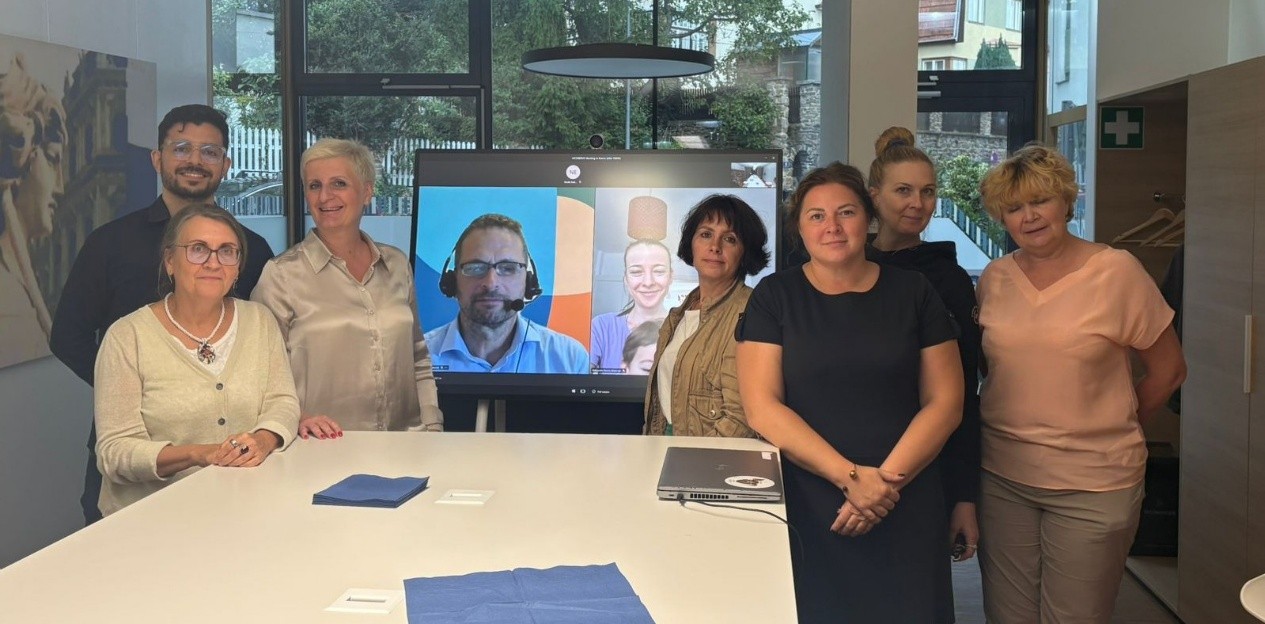
The workshop focused on shaping the structure of a joint interdisciplinary Master’s program, designed to equip future professionals with the competencies needed to lead digital transformation, evidence-based policymaking, and sustainable public sector innovation.
The workshop began with a welcome note and introduction by Nina Rizun, who outlined the meeting’s goals and provided an update on the project’s progress and objectives for the upcoming months.
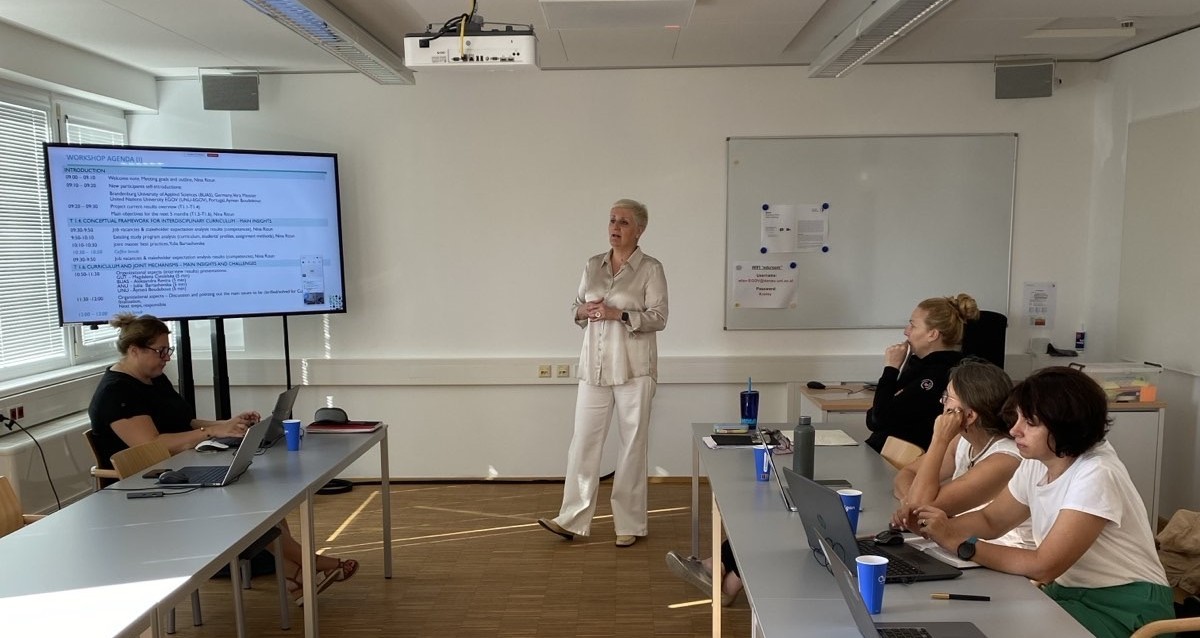
Picture 1: Opening session and project overview
Participants then reviewed the latest results from job vacancy and stakeholder expectation analyses, study program mapping, and examples of Joint Master best practices. These insights framed the curriculum design discussion by linking labour market demands, academic structures, and stakeholder needs.
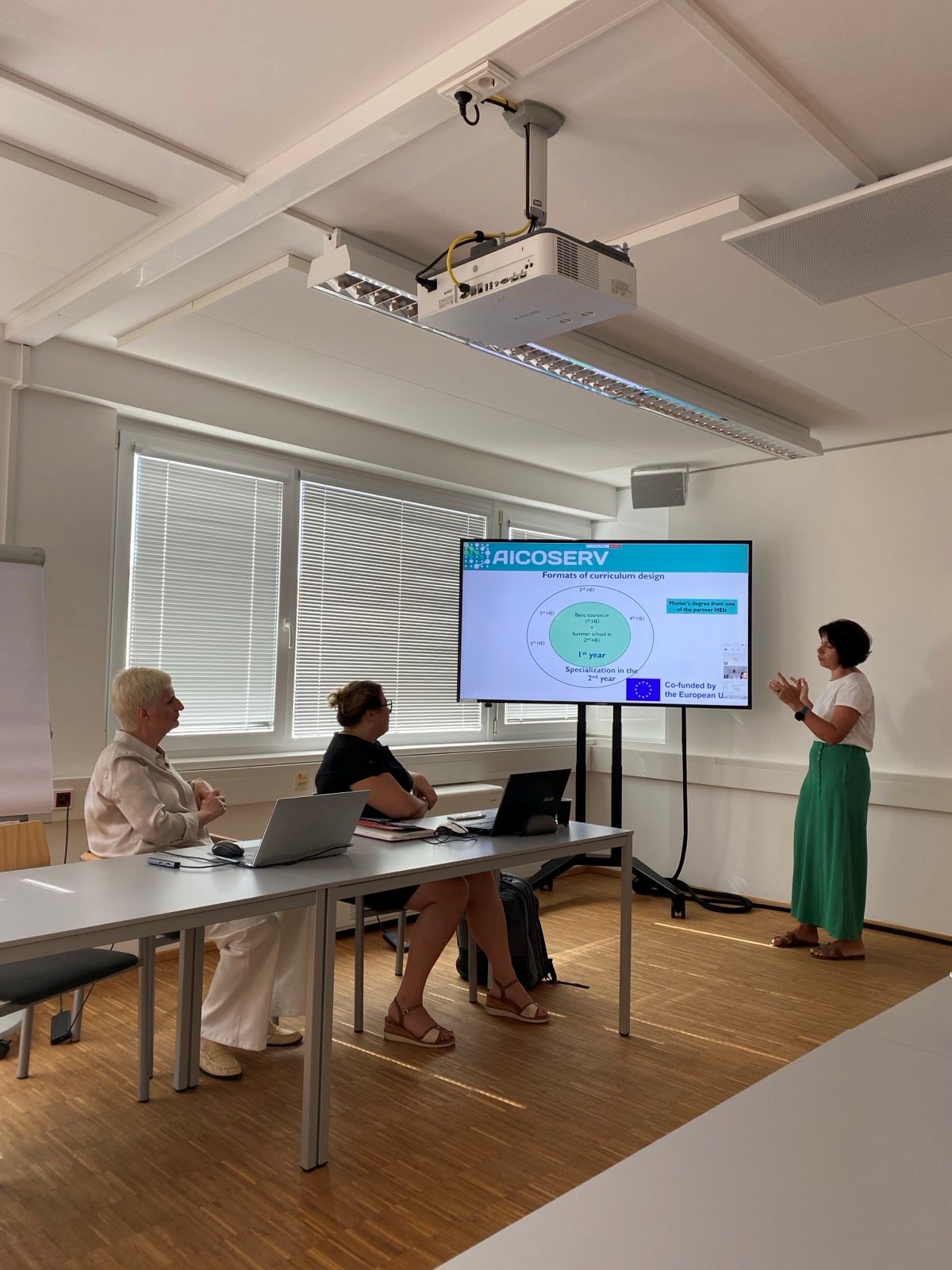
Picture 2: Presenting the examples of Joint Master best practices
The next part of the session featured short presentations on organizational aspects from different partners, followed by a collective discussion on challenges and open questions. Together, we identified critical issues that need to be clarified before the curriculum structure can be finalized.
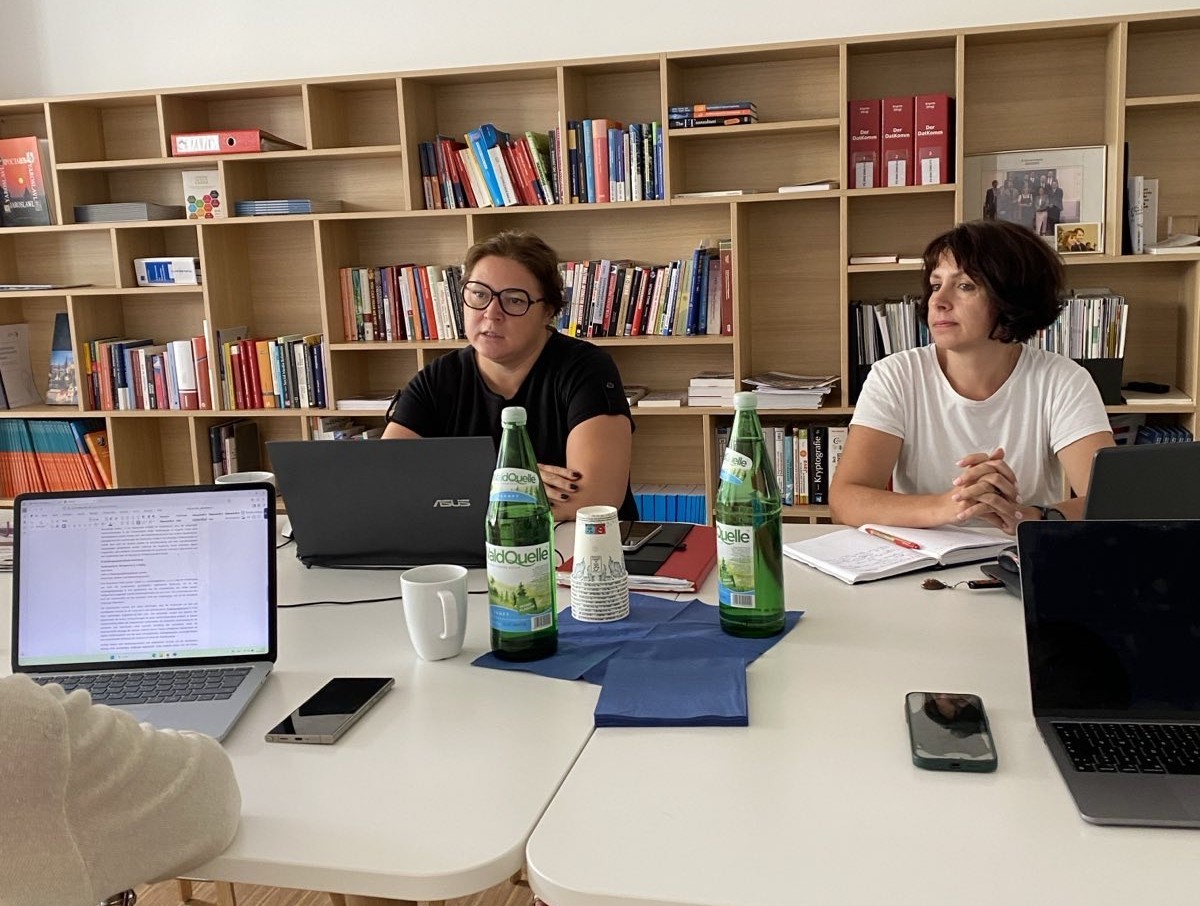
Picture 3. Discussion on organizational aspects and challenges
Then participants engaged in an extended joint discussion, focusing on:
- Possible modular structures and learning objectives for the program
- Options for semester distribution and specializations
- Integration of interdisciplinary dimensions: co-creation, ethics, evidence-based decision-making, sustainability, AI, and legal/regulation
- Planning for upcoming tasks, including refinement of modules and mechanisms such as summer schools, internships, and diploma thesis support
The session concluded with a clear set of next steps and responsibilities for continuing the curriculum development process.
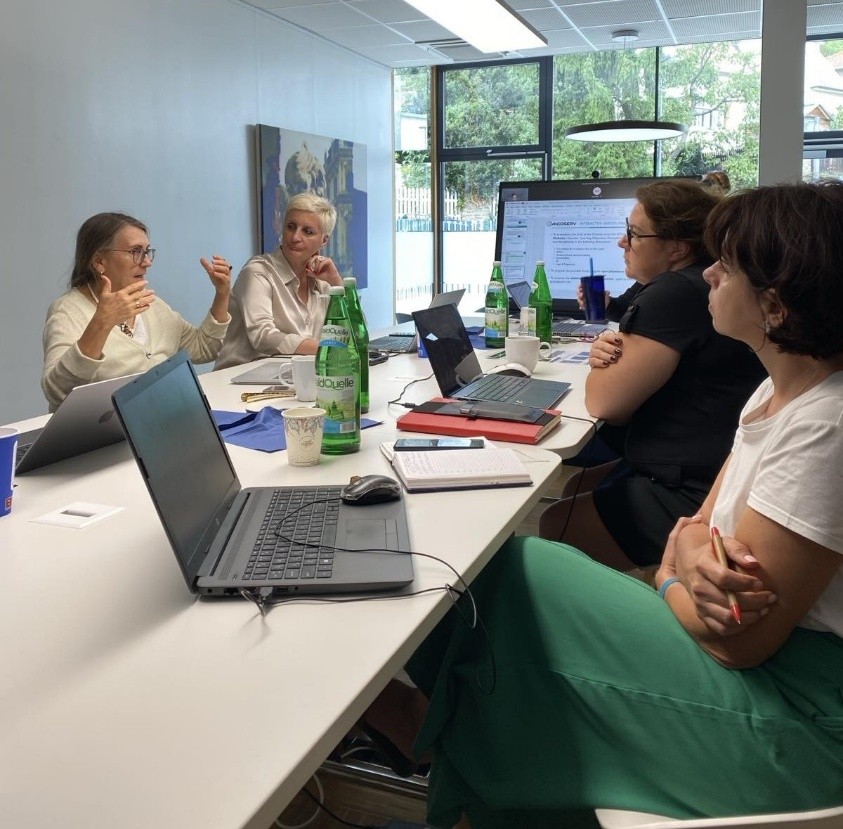
Picture 4: Joint Discussion and planning the next steps
We sincerely thank all participants for their commitment and valuable input: Noella Edelmann, Nina Rizun, Magdalena Ciesielska, Vera Meister, Yulia Bartashevska, Nina Khairova, Aymen Boudebouz, Aleksandra Revina, and Dimitrios Sarantis.
This internal workshop marked an important step forward in the AICOSERV project, bringing us closer to the delivery of an innovative European curriculum for AI-enabled co-creation and public sector transformation.
Stay tuned for updates as we continue to refine the program structure and prepare for the next phases of development.
AICOSERV Workshop at EGOV2025: Developing a Model for Sustainable Digital Co-Creation in the Public Sector, September 4, 2025
Last week, at the EGOV2025 Conference hosted by the Digital Government Society at the Universität für Weiterbildung Krems, Austria, we had the pleasure of organizing workshop: “Developing a Model for Sustainable Digital Co-Creation in the Public Sector.”
The aim of the workshop was to raise awareness and build a network of key stakeholders around the integration of AI into public sector co-creation, addressing existing gaps in education and contributing to a labour market equipped with professionals capable of leading sustainable innovation and digital transformation.
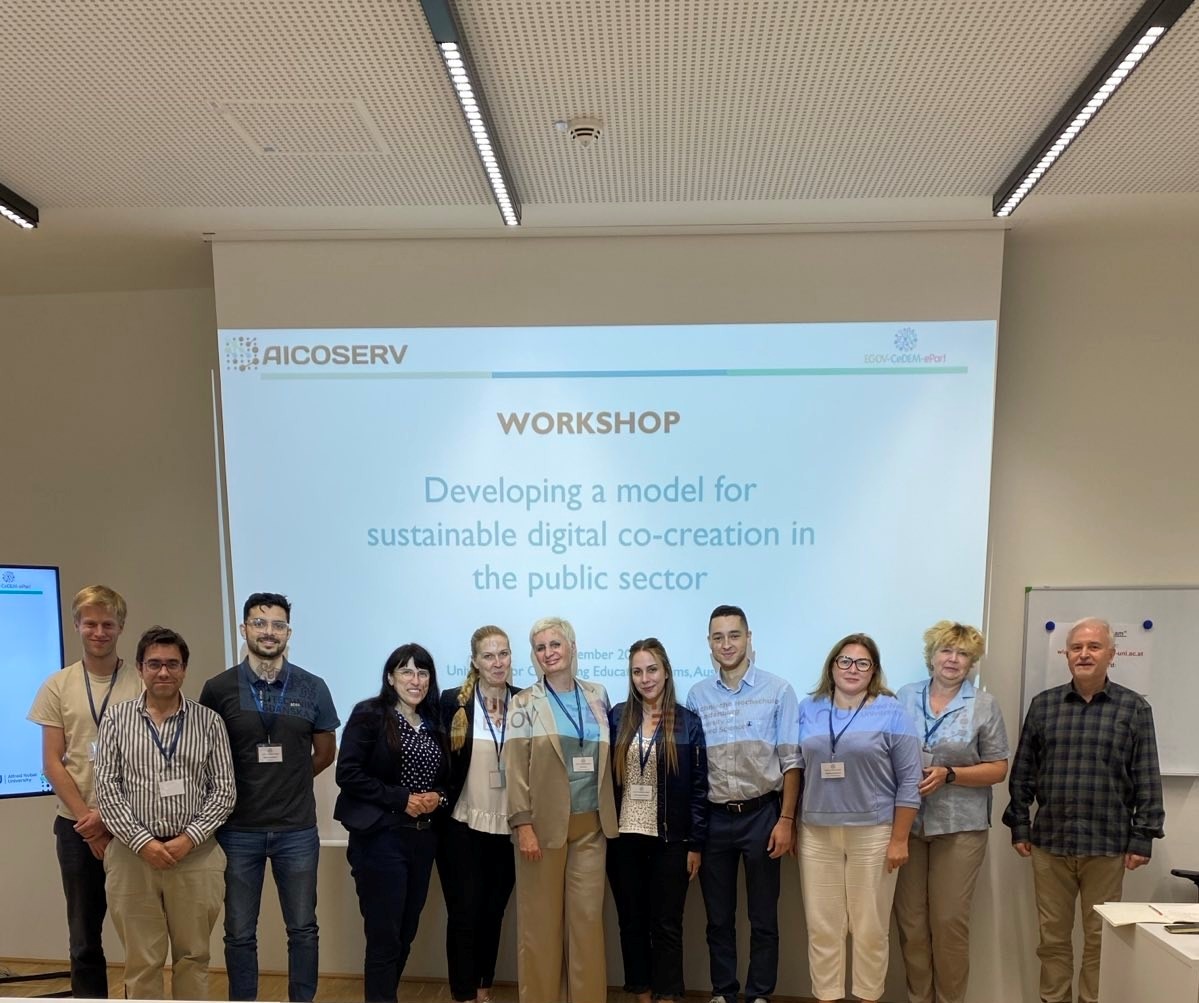
The event began with the opening session led by Dr. Nina Rizun, who introduced the AICOSERV project and outlined the workshop’s goals.
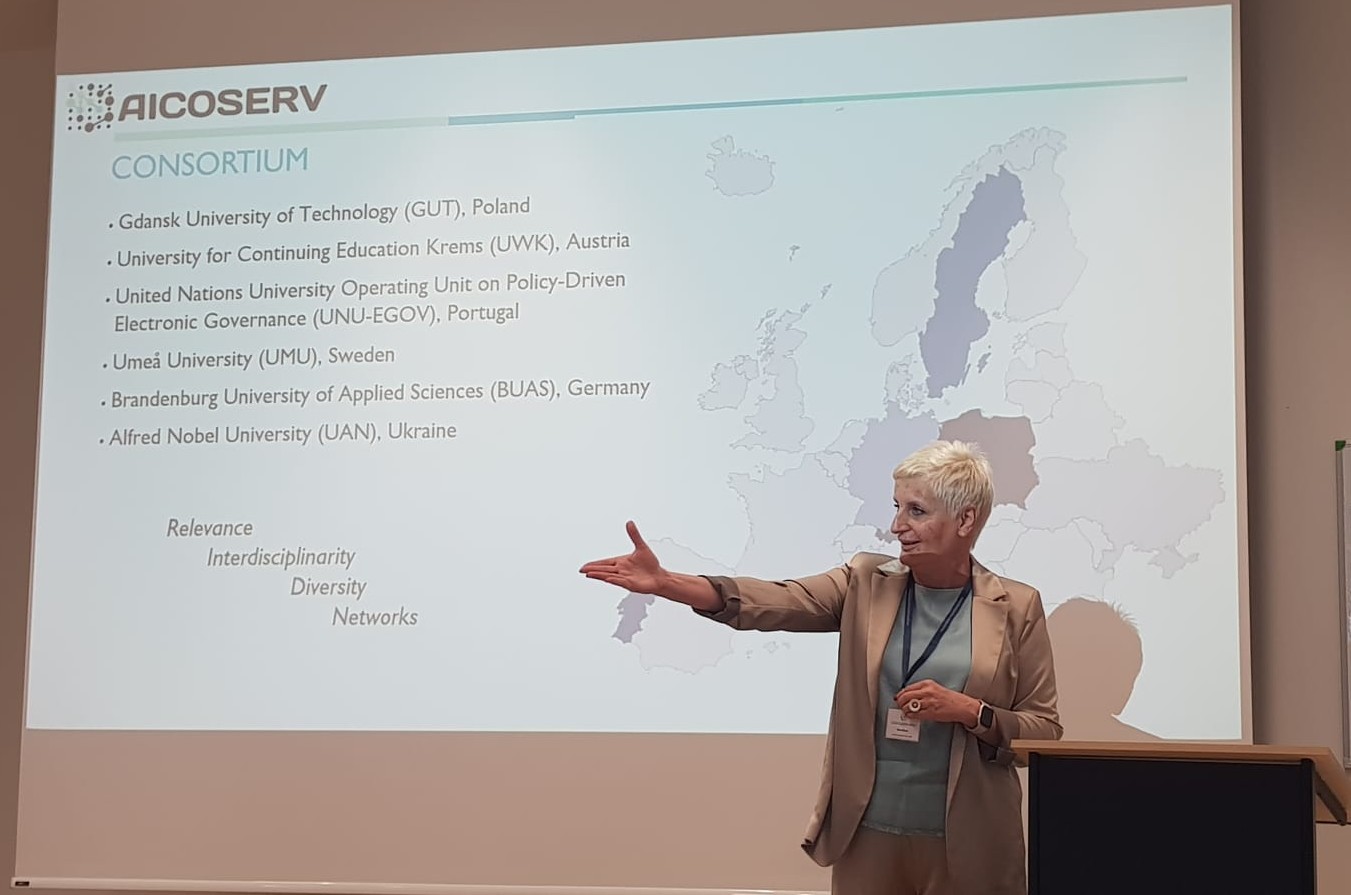
Picture 1: Introductory presentation
This was followed by the conceptual model presentation by Dr. Noella Edelmann, who presented the AI-enabled co-creation framework for evidence-based policymaking, setting the foundation for interactive discussion.
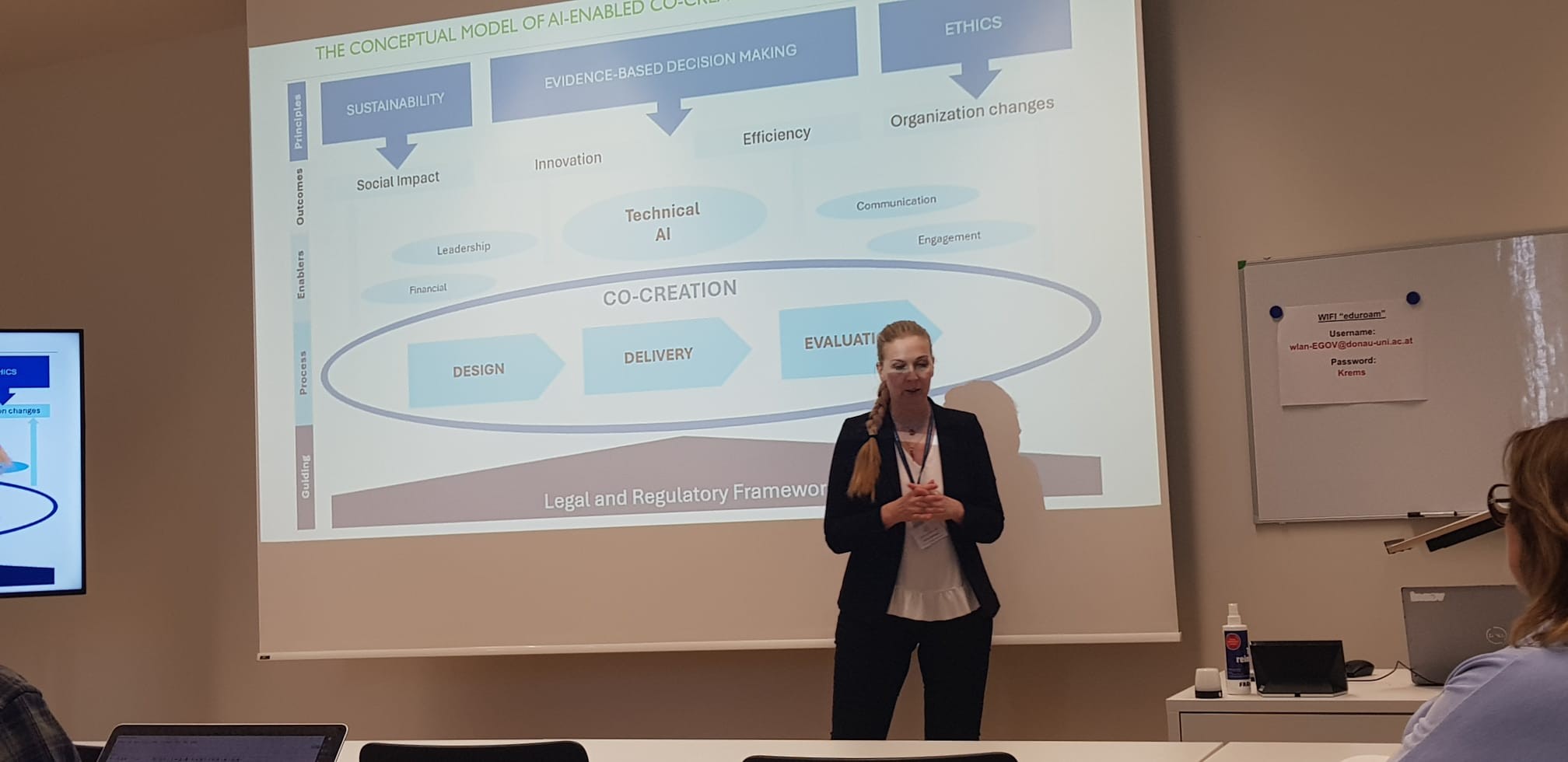
Picture 2: Presentation of the conceptual model of AI-enabled co-creation for evidence-based policymaking
The workshop then moved into the discussion session moderated by Dr. Nina Rizun, where participants engaged in small-group brainstorming and case reflections. They explored the applicability of digital and AI tools, the risks of data governance and accessibility, the role of human-centered AI, and the interdisciplinary competencies required for sustainable public sector innovation
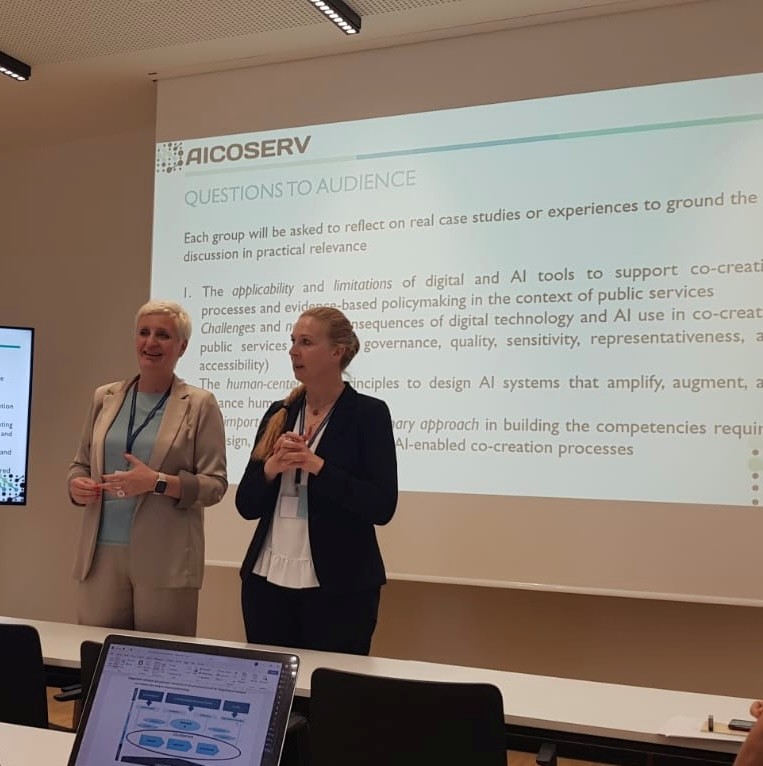
Picture 3: Interactive brainstorming session
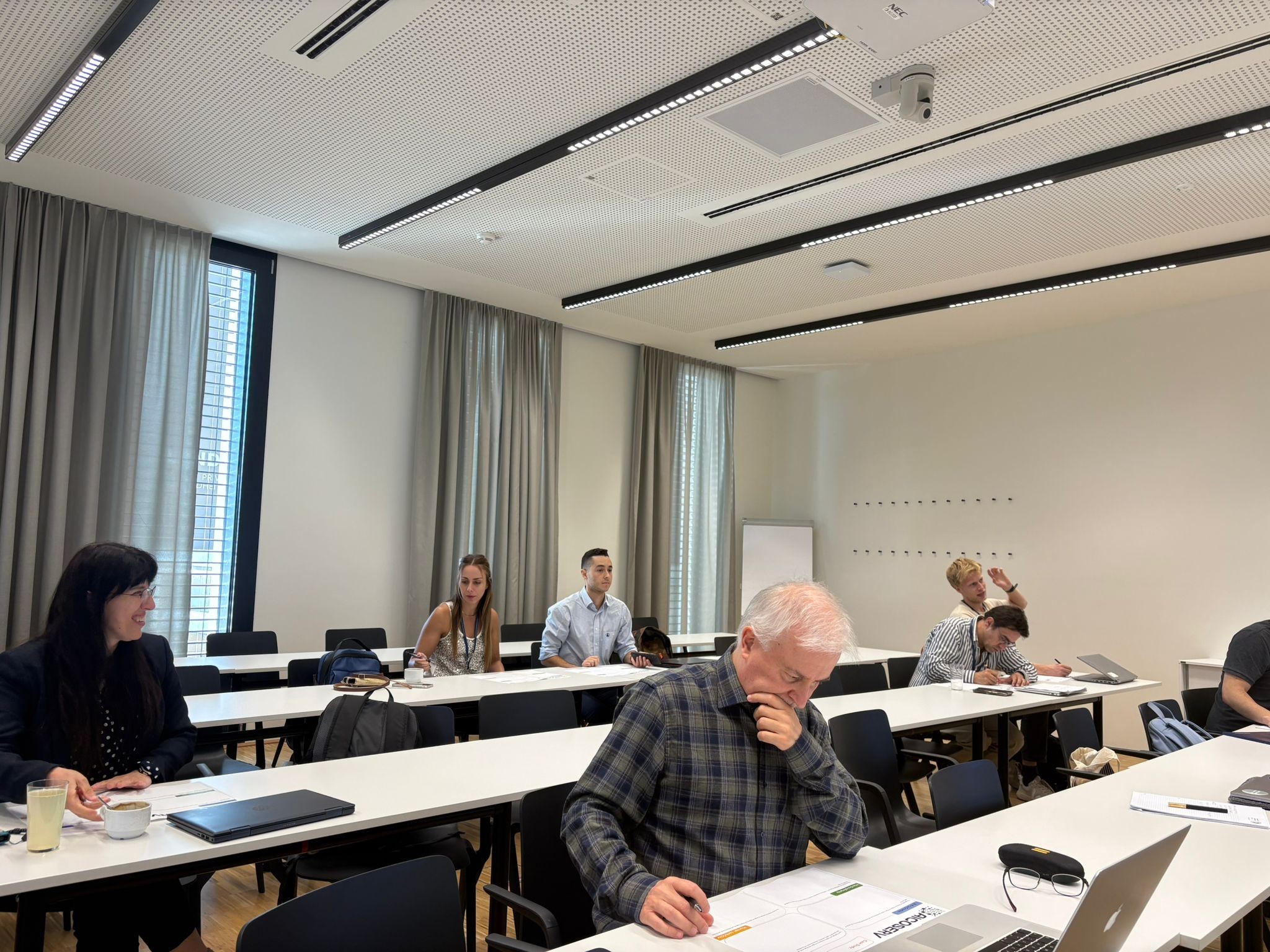
Picture 4: Group Presentations & Synthesis
Key takeaways from the workshop included:
- AI is not only a technical tool but a catalyst for rethinking governance and citizen participation;
- The Human-in-the-Loop principle is essential to ensure accountability, trust, and fairness throughout the AI lifecycle;
- Competency gaps go beyond technical skills and call for hybrid professional profiles combining technical, managerial, ethical, and legal expertise;
- Education and training must adopt interdisciplinary, challenge-based formats, integrating real-world cases, ethical dilemma simulations, and co-creation exercises;
We sincerely thank all participants for their contributions and the EGOV community for offering such a vibrant platform for dialogue and collaboration. This workshop was another important milestone in advancing the AICOSERV agenda of linking AI, co-creation, and evidence-based policymaking.
Stay tuned for the next AICOSERV events !
Co-creation for Public Administration - Engaging Citizens in the AI Lifecycle: Stakeholder Workshop at UNU-EGOV, On 3 July 2025
On 3 July 2025, UNU-EGOV hosted the workshop “Co-creation for Public Administration: Engaging Citizens in the AI Lifecycle”, held at its premises in Guimarães and streamed online, as part of the AICOSERV (AI Technologies for Sustainable Public Service Co-Creation) project.

The full-day event brought together experts, public officials, and researchers to explore how citizens can be meaningfully engaged with AI systems in public administration. Through a rich program of keynotes, panel discussions, and interactive breakout sessions, participants reflected on the power of co-creation to shape and design AI for Public service and Government, but also explored the use of digital tools, including AI in co-creation. The participants shared insights, case studies, experiences, and lessons learned regarding citizen engagement for AI development and deployment.
Programme highlights included opening remarks by UNU-EGOV and AICOSERV leads, notably Luis Soares Barbosa (UNU-EGOV) and Naci Karkin (AICOSERV Project Coordinator), followed by keynote presentations from:
- J. Ignacio Criado (Universidad Autónoma de Madrid), who addressed macro, meso, and micro perspectives of co-creation in AI and public administration;
- Elsa Estevez (National University of the South, Argentina), who emphasized the importance of co-creation and education in the public sector;
- Manuel Filipe Santos (University of Minho, Portugal), who explored current trends and challenges in AI for enhanced citizenship.

Picture 1: Opening panel: Best practices and challenges in citizen engagement
A dynamic panel discussion on best practices and challenges in citizen engagement highlighted the competencies and skills to develop, moderated by Elsa Estevez and with the contribution of Adrijana Paljušević (UNU-EGOV), Paulo Vale (AMA), and Francisco Carvalho (Laboratório da Paisagem).

Picture 2. Best practices and challenges in citizen engagement discussion
Finally, a hands-on breakout activity led by Catarina Fontes (TUM), where participants co-designed practical frameworks for inclusive AI governance.



Picture 3. Hands-on breakout activity
Throughout the day, discussions explored participatory methodologies such as living and innovative labs, digital platforms, and different frameworks with a strong emphasis on trust, transparency, and aligning AI systems with local values.
The workshop concluded with developing actionable recommendations for embedding co-creation in digital governance strategies at all levels.
Public Sector in the AI Age: Stakeholder Workshop at Alfred Nobel University, May 22 2025
On 22 May 2025, Alfred Nobel University, Dnipro, Ukraine, hosted the third stakeholder workshop in the AICOSERV series, titled “Public Sector in the AI Age: Needs, Barriers, and Untapped Opportunities.” Held virtually via Zoom, the event brought together over 30 stakeholders from regional public administrations, academia, civil society, and the tech sector, united by a shared goal: to harness AI for more inclusive, responsive, and co-created public services.
The session opened with an introduction to the AI-enabled co-creation model and its relevance for designing and delivering public services. Participants explored how AI can act not just as a tool, but as a structural enabler of innovation, reshaping how governments engage with citizens and how services are conceptualized and delivered

Picture 1: Dr. Yuliia Bartashevska presents the introduction to the AI-enabled co-creation model
This was followed by case studies from Ukraine and internationally, showcasing how AI is already transforming governance, from improving decision-making processes to supporting service personalization and proactive public engagement. These examples grounded the discussion in practical, high-impact applications.

Picture 2. Participants discussing the co-creation and participatory approaches in the public sector
Participants then moved into breakout sessions, where they collaboratively mapped challenges, needs, and opportunities across various stages of co-creation. Discussions highlighted recurring concerns around system-level inertia, regulatory lags, skill gaps, and ethical governance, while also surfacing bold ideas and actionable opportunities for transformation.
The day closed with group discussions on the competencies and future-ready skills public servants will need to co-create AI-driven, citizen-centric services. Participants emphasized the growing importance of interdisciplinary thinking, ethical data use, systems leadership, and inclusive design capabilities.

Picture 3: Breakout sessions
Special thanks to Yuliia Bartashevska and Hanna Bondarovych for organizing this thoughtful, well-executed event, and to all participants for your contributions, engagement, and vision. Together, we are shaping the path for responsible, co-created digital governance.
Stay tuned for upcoming events in the AICOSERV workshop series – the journey toward AI-enabled public service transformation continues!
AI-enabled Co-Creation in the Public Sector: Stakeholder Workshop at Gdańsk University of Technology, 15 May, 2025
We were excited to host the second workshop in our AICOSERV series, this time focusing on “AI-Enabled Co-Creation in the Public Sector: Identifying Needs, Challenges, and Capacity Gaps.” Held on 15 May 2025 at the Faculty of Management and Economics at Gdańsk University of Technology, the event brought together public sector representatives and academics to explore what it truly takes to make AI-supported co-creation work in practice. With participants from the City Halls of Wrocław and Warsaw and engaged academic stakeholders, the workshop created a vibrant space for exchange on how to align emerging technologies with public value and inclusive innovation.
The day began with keynote presentations by Dr. Nina Rizun and Dr. Eng. Magdalena Ciesielska, who offered frameworks for thinking about AI not only as a technical tool, but as a catalyst for transforming relationships between institutions and citizens.

Picture 1: Dr. Nina Rizun presents the current landscape and future potential of AI in transforming public services co-creation"

Picture 2. Dr. Eng. Magdalena Ciesielska discusses the importance of co-creation and participatory approaches in the public sector
Breakout sessions followed, giving space for participants to collaboratively map out critical skills, cross-sector competencies, and enabling institutional conditions required to advance AI-enabled co-creation in the public sector


Picture 3: Breakout sessions
We sincerely thank all participants - Tomasz Janowski, Marcin Sikorski, Marita McPhillips, Artur Wawrzyniak, Marta Krukar, Kamil Rosa, Wojciech Krzosa, Justyna Wańkiewicz, and Marcin Adamski - for their energy, ideas, and dedication to exploring new approaches to digital public service innovation.
Key insights from the day included:
- Let’s start not with what we know - but with what we lack, don’t understand, or hesitate to face
- Innovation begins with shared understanding - across departments, sectors, and disciplines
- Trust, soft skills, and open dialogue matter as much as tech and data
- Tech moves fast - regulation rarely keeps up
- Co-creation must flow both ways: to citizens, and back into public institutions
- We need bridges - between tech and society, ideas and action
- Unified processes and strong knowledge sharing make change possible
- The future must be co-created - through honest conversation and collective curiosity
This was another important step in building a community of practice around AI and co-creation in public sector - and we’re only just getting started.
Stay tuned for the next events in the AICOSERV workshop series!
Responsible AI in Public Services: Stakeholder Workshop at Umeå University, April 9, 2025
We were thrilled to launch the first in a series of stakeholder workshops dedicated to exploring how artificial intelligence can be responsibly integrated into public services. Hosted by the AI Policy Lab at Umeå University, the workshop brought together a diverse group of participants, including policymakers, researchers, public sector professionals, and industry experts, to reflect on current challenges and co-create strategies for the ethical and sustainable use of AI.

Picture 1: Workshop opening
The event, titled "AI Technologies in Public Service: A Workshop for Identifying Needs, Challenges, and Solutions", centered around the theme "Ensuring Ethical AI: Aligning Technology with Human Values." It aimed to examine the growing necessity of integrating AI into public services in ways that are both effective and socially responsible.
The workshop opened with a powerful keynote address by Prof. Virginia Dignum, titled "Ensuring Ethical AI: Aligning Technology with Human Values," which set the tone for thoughtful dialogue throughout the day. Dr. Henry Lopez-Vega offered an insightful regional perspective, highlighting the specific challenges faced in Västerbotten related to AI adoption in public services.

Picture 2: Virginia Dignum inspirational talk: "Ensuring Ethical AI: Aligning Technology with Human Values"

Picture 3: Henry Lopez-Vega insightful overview on AI challenges in Västerbotten
Breakout sessions gave participants the opportunity to explore pressing questions in small groups, including what the public sector truly needs from AI, what competencies are required from professionals facilitating this transformation, and how diverse stakeholders can come together to build public services that are not only smarter, but also more transparent, inclusive, and sustainable. Insights gathered during the workshop will inform the design of an interdisciplinary master’s level study program focused on AI technologies for co-creation in the public sector.

Picture 4: Breakout sessions (hybrid)
We are especially grateful to the workshop organizers - Nina Khairova, Nina Rizun, Henry Lopez-Vega, Viktoria Movchan, Virginia Dignum and the whole AICOSERV project team - for creating such a well-structured, inclusive, and inspiring space for exchange.
The workshop attracted representatives from Swedish government organizations, healthcare and transport authorities, municipal education and social services institutions, as well as university staff and researchers. In total, the event brought together around 25 in-person participants and 30 attendees who joined online. We sincerely thank all participants for their active engagement, thoughtful contributions, and shared vision of co-creating responsible AI for the public good.
This is just the beginning — we look forward to continuing the conversation in our next workshops.
Kick-Off Meeting, 17-18.12.2024, Gdańsk, Poland
On 17-18 December 2024, the AICOSERV project officially commenced with a highly productive Kick-Off Meeting hosted by Gdańsk University of Technology. The event brought together representatives from the project’s consortium to align on its objectives and establish a collaborative framework for implementation.
(From left to right in the photo)
- Naci Karkin - United Nations University Operating Unit on Policy-Driven Electronic Governance (UNU-EGOV, Portugal)
- Tomasz Janowski - Gdańsk University of Technology (Poland)
- Nina Rizun - Gdańsk University of Technology (Poland)
- Nina Khairova - Umeå University (Sweden)
- Magdalena Ciesielska - Gdańsk University of Technology (Poland)
- Noella Edelmann - University for Continuing Education Krems (Austria)
- Yuliia Bartashevska - Alfred Nobel University (Ukraine)
- Anna Bondarovich - Alfred Nobel University (Ukraine)
- Aleksandra Revina (online) - Brandenburg University of Applied Sciences (Germany)
Day 1 Highlights
The first day provided a foundational understanding of the project’s objectives, structure, and management. The meeting opened with welcoming remarks from the hosting institution’s leadership – Dr Marta Kuc-Czarnecka – Vice-Dean for Organization of Studies, Prof. Michał Tomczak – Vice-Dean for Cooperation and Development
Prof. Tomasz Janowski – Head of the Department of Informatics in Management, followed by institutional presentations that showcased the consortium's diverse expertise.
Dr. Nina Rizun, the project coordinator, presented a detailed overview of the project’s vision, highlighting the necessity of transitioning to citizen-centered public services and the transformative potential of AI technologies. Key sessions covered financial management, risk and impact management, and quality assurance, emphasizing administrative and compliance requirements. Sustainability planning was a central focus, with discussions on securing Erasmus Mundus Joint Masters funding to ensure the program’s long-term impact.
Day 2 Highlights
The agenda revolved around Work package 1 (WP1), which includes nine tasks essential for the development of the program, such as analyzing the subject area, understanding stakeholder needs, and designing the curriculum and supporting mechanisms.
Partners presented their approaches to the key tasks, discussing methodologies, expected outcomes, and timelines. Topics included the exploration of the context and needs for public service co-creation supported by AI, the preparation and execution of stakeholder workshops, and the integration of interdisciplinary learning approaches into the curriculum framework.
The project team emphasized the role of collaborative workshops and interviews with practitioners to refine approaches, validate findings, and engage stakeholders. Detailed plans for preparatory activities, and conference/journal paper submissions were also outlined. The consortium collectively agreed on responsibilities for task leaders and timelines for deliverables. By addressing challenges, refining methodologies, and solidifying the project roadmap, the discussions set a productive tone for the upcoming phases of the AICOSERV initiative.
Main Outcomes
- Agreement on detailed timelines and responsibilities for project tasks.
- Commitment to workshop schedules for stakeholder engagement and validation.
- Development the plan for Call for Papers on curriculum design and operational mechanisms.
- Adoption of shared tools to align and refine task timelines.
- Emphasis on securing Ethical clearance for project activities
The Kick-Off Meeting underscored the consortium’s collective commitment to delivering an innovative and impactful educational program. Through collaborative discussions and strategic planning, the partners set a strong foundation for the project’s success.



